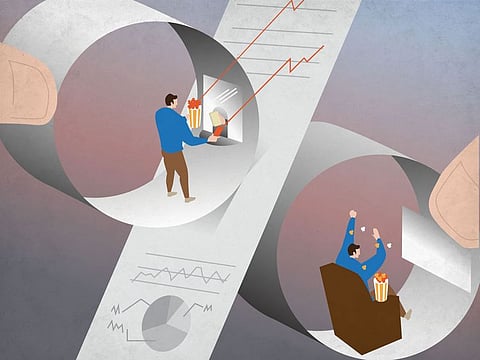Don’t start tinkering with GDP inputs
Whether measuring happiness or any other detail, it’s best to do so separately

Every so often you see someone demand that leaders abandon their focus on gross domestic product in favour of other metrics of economic success. Some countries are actually trying to do this.
For example, New Zealand just introduced a happiness index (Bhutan did something similar two decades ago). But modifying GDP is probably more trouble than it’s worth.
GDP does have plenty of flaws, even as an economic indicator. First of all, it leaves out a lot of things that represent real value. When your dad washes the dishes, that represents value creation — if the dishwashing took place in a restaurant, it would be compensated monetarily, but since it happens for free at home, it gets ignored.
GDP also ignores the value of leisure — if you pay $10 to see a movie in a theatre, it gets counted in GDP, but if you have an equal amount of fun hanging out with your friends, that value isn’t counted.
More to GDP than economic benefits
Beyond these deficiencies, there’s the broader fact that economic value isn’t the only kind of value. Japanese people, for instance, are on average poorer than Americans in purely material terms, but the very low crime, efficient urban design, and clean streets and buildings has real value that isn’t counted in economic statistics.
The US and Canada, meanwhile, have an abundance of natural beauty and open space that adds little to GDP, while many European and Asian countries enjoy advantages in health and life expectancy that are also uncounted. These are the kind of things that Bhutan and New Zealand are trying to account for, some of which are also included in the United Nations’ Human Development Index.
GDP also doesn’t account for inequality or other issues of distribution.
A third problem with GDP is that it’s not much more than a snapshot of the present. It represents the amount of economic value that’s produced this year, rather than the amount that can be produced sustainably during the coming decades or centuries.
An indicator that captures only a moment in time
Chopping down rainforests, draining aquifers, exhausting topsoil and burning fossil-fuel that contributes to climate change all raise GDP, but don’t necessarily make humanity better off in the long run.
But the solution to these problems doesn’t lie in trying to fix GDP, or replace it with another indicator that better represents the totality of human well-being and progress. The reason is that there will never be such an indicator.
Economists have long sought to create a total measure of human welfare, and use this to evaluate economic policies. But although there are certain formulas that tend to get used in a lot of economic papers — mostly because they’re simple and mathematically easy to work with — the profession has not generated any broad consensus of how to measure societal success with a single number.
And there are powerful reasons to suspect that they never will. In 1951, economist Kenneth Arrow’s so-called impossibility theorem demonstrated that any measure of social welfare will entail overriding the will of the collective in some way.
Either it will mean having a dictator who’s in control of everything, or it will encounter situations in which society’s choices go against every single person’s desires, or it will force society into bizarre trade-offs based on irrelevant factors.
More recent economists have come up with welfare measures that look reasonable in most cases. But Arrow’s theorem does suggest that trying to construct one single benchmark of a society’s success isn’t the way to go.
Instead, policymakers should look at a number of indicators, and choose how much to emphasise each one as the situation demands.
Instead of trying to update GDP to include sustainability, health, education, happiness, equality, leisure, and safety, leaders should monitor these things independently. Fortunately, there is every indication that most of them do this already.
Most countries enact stricter laws regarding air, water and food quality as their incomes go up, even though this could potentially reduce GDP. Labor laws, too, tend to be stricter in developed nations. When crime was a big problem in the US in the 1980s and early 1990s, it received a lot of attention and money even though it arguably wasn’t subtracting a huge amount from GDP.
Similarly, the epidemic of opioid abuse, alcoholism and suicide in the US is increasingly being tackled by policymakers and economists alike. Meanwhile, more leaders in the US are proposing bold policies to combat inequality.
Some may argue that global warming is the big exception — that leaders are destroying the climate in a mad rush for GDP growth. But changing the definition of GDP won’t alter the desire for cars, electricity and meat in developing nations, as China discovered when it tried to introduce a measure of green GDP in the 2000s.
Nor will it weaken the lobbying clout of fossil-fuel companies that act as a drag on climate action in rich countries. The trade-offs policymakers deal with on the climate issue are real and material — they are not caused by a myopic focus on a single economic indicator.
So instead of trying to fix GDP, it’s better to simply remember its limitations. It is not the one economic number to rule them all, but simply one of a broad set of indicators of a society’s success.
Sign up for the Daily Briefing
Get the latest news and updates straight to your inbox


